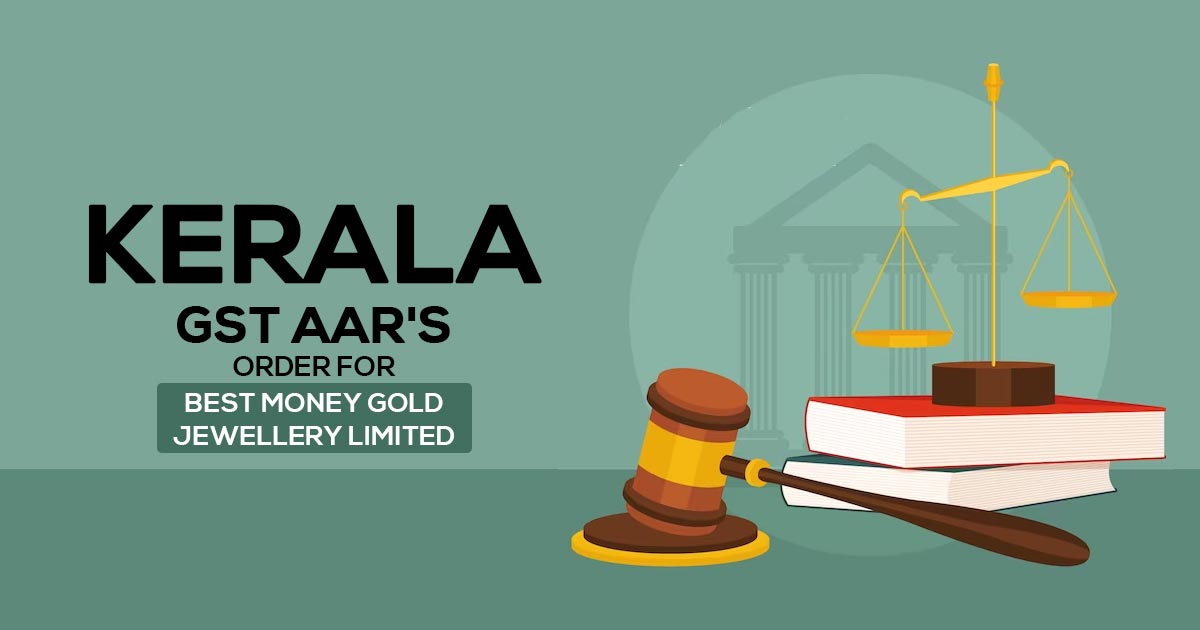
According to a recent ruling by the Kerala Authority for Advance Ruling (AAR), tax reductions provided under Rule 32(5) of the Central Goods and Service Tax (CGST) Rules are not applicable when gold is not considered a second-hand commodity.
The applicant in this case, Best Money Gold Jewellery Limited, is engaged in the business of purchasing and reselling used or old or second-hand or pre-owned gold jewellery and ornaments from unregistered individuals.
It was made clear that, except for certain provisions, the provisions of the Kerala State Goods and Services Tax Act, 2017 (the KGST Act) and the Central Goods and Services Tax Act, 2017 (the Act) are similar. As a result, references to the CGST Act, Rules, and notifications issued thereunder in the following text also include references to the related KGST Act, Rules, and notifications issued thereunder.
The applicant asserts that they buy gold from unregistered individuals who are from the general public, and the ornaments they purchase are sold to end users “as such.” This means that they are sold to another registered person without any further processing, except for minor cleaning and polishing that does not alter the nature of the ornament or jewellery.
Furthermore, the applicant claims that they are not eligible to claim an input tax credit under Section 16 of the CGST Act because the majority of their purchases involve old or used or second-hand gold ornaments/jewellery from unregistered persons. When selling such old/used/second-hand gold jewellery/ornaments, the applicant applies a GST rate of 3% on the total amount paid by the buyers.
To determine the value of the supply in accordance with Section 15(5) of the CGST Act, 2017 read with Rule 32(5) of the CGST Rules, 2017, the applicant sought clarification based on the given facts.
The value of the supply of goods or services is generally governed by Section 15 of the CGST Act. The value of used or second-hand products is evaluated in accordance with Section 15(5) of the CGST Act, as specified by the government through a Notification of the Council.
Additionally, when used items are purchased for the first time from the primary market, indirect taxes such as VAT and GST are levied. This implies that used products have already paid full tax whenever tax is paid on the profit margin from their sale. The provision in Rule 32(5) stating “where no input tax credit has been availed on the purchase of such goods shall apply” raises the question of when this provision is applicable.
This phrase, which is used in Rule 32(5), appears to be intended to prevent the dealer from making a GST-paid purchase of second-hand or used goods from a registered person and taking advantage of the simultaneous payment of the tax on margin and claim of an input tax credit(ITC).
Each party in the value-added tax chain is required to pay tax on the value addition he made to the transaction under the GST, which is a value-added tax. In order to prevent a dealer operating in an unorganised sector—buying second-hand or used goods from unregistered individuals or non-business entities—from being burdened with a tax liability out of proportion to the value addition he made in the supply chain, is the intention behind promulgating Rule 32(5).
The goal of Sub-Rule (5) to Rule 32 of the CGST Rules, 2017, as viewed, is to reduce the tax burden on items that have already paid tax on their highest value when they were sold for a lower price on the secondary market after being used. Contrarily, with items like gold and gold jewellery, the value is essentially defined by the content, purity, and fineness of the material contained therein.
Important: Gold GST Rate: Impact on Consumers Before and After
It must be established that the applicant is engaged in the business of dealing in used goods in order for the applicant to be eligible for inclusion under the value of supply as contemplated by sub-rule (5) of Rule 32. Unfortunately, gold does not pass the standard for “second-hand goods” in any form.
The Authority, which was comprised of Dr S.L. Sreeparvathy, an IRS, and Shri. Abraham Renn S., an IRS, determined that the applicant’s supply does not meet all of the standards outlined in Rule 32(5) of the CGST Rules 2017. As a result, the benefit of provisions under sub-rule (5) of the CGST Rules 2017 cannot be availed.
| Applicant | M/s. Best Money Gold Jewellery Limited |
| GSTIN | 32AAGCB1247B1ZF |
| Date | 02.03.2023 |
| Representative | Mr. J. Balasubramanian |
| Kerala GST AAR | Read Order |









